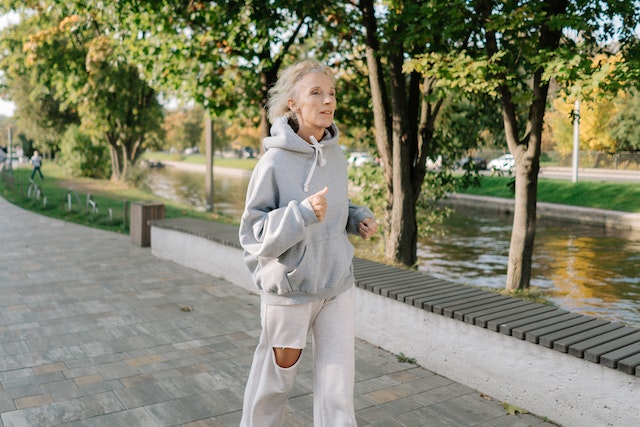As we age, maintaining mobility becomes increasingly important for our overall health and well-being. Fortunately, there are scientifically proven strategies that can help seniors boost their mobility and enjoy an active lifestyle. By incorporating these strategies into their daily routines, seniors can revitalize their bodies and minds, promoting independence and a higher quality of life. Let’s explore these mobility boosters and their scientific backing.
1. Stay Active with Regular Exercise: Engaging in regular exercise is one of the most effective ways to improve mobility and overall physical function. Scientific studies have consistently shown that exercise can increase muscle strength, improve balance, and enhance flexibility in seniors. Aim for a combination of cardiovascular exercises, strength training, and flexibility exercises to target different aspects of mobility. Consult with a healthcare professional or a certified trainer to design an exercise program that suits your individual needs and abilities.
2. Balance and Fall Prevention Training: Falls are a major concern for seniors, often leading to injuries and a decline in mobility. Balance and fall prevention training programs have been proven to be effective in reducing fall risk and improving balance. These programs typically involve exercises that challenge balance, such as standing on one leg or walking on uneven surfaces. Additionally, they may include strength exercises to improve muscle coordination and stability. Participating in these programs under the guidance of a trained professional can significantly enhance mobility and reduce the risk of falls.
3. Maintain a Healthy Diet: Proper nutrition plays a crucial role in supporting mobility and overall health. Consuming a balanced diet rich in fruits, vegetables, whole grains, lean proteins, and healthy fats provides the necessary nutrients for optimal muscle function and joint health. Certain nutrients, such as calcium and vitamin D, are particularly important for bone health, which directly influences mobility. Additionally, maintaining a healthy weight through a nutritious diet can alleviate stress on the joints and improve mobility.
4. Stay Socially Engaged: Social engagement and maintaining strong social connections have been linked to better physical and cognitive function in seniors. Participating in social activities, joining clubs or community groups, and spending time with friends and family can positively impact mental well-being, reduce stress, and enhance motivation to stay active. Engaging in social interactions also provides opportunities for physical activities such as group walks, dancing, or team sports, which can further improve mobility.
5. Get Quality Sleep: Adequate sleep is essential for overall health and plays a significant role in maintaining optimal mobility. During sleep, the body repairs and restores tissues, including muscles and joints. Poor sleep can lead to fatigue, reduced muscle function, and impaired mobility. Establish a regular sleep routine, create a comfortable sleep environment, and prioritize the recommended amount of sleep for seniors, which is typically 7-8 hours per night. Quality sleep will help rejuvenate your body and contribute to better mobility.
6. Seek Professional Guidance: Consulting with healthcare professionals, such as physical therapists or geriatric specialists, can provide personalized guidance and recommendations for improving mobility. These professionals can assess your specific needs, develop customized exercise programs, and offer valuable advice on managing any existing conditions or concerns. They can also help address specific mobility challenges and provide appropriate interventions and strategies.
Incorporating these scientifically proven mobility boosters into your daily life can have a transformative impact on your overall well-being as a senior. By staying active, focusing on balance and fall prevention, maintaining a healthy diet, nurturing social connections, prioritizing sleep, and seeking professional guidance, you can revitalize your body and mind, enjoy increased mobility, and embrace an active and fulfilling lifestyle.
Remember to start gradually and listen to your body. Consult with your healthcare provider before making any significant changes to your exercise or diet routines, especially if you have existing health conditions or concerns. With dedication and perseverance,
you can maximize your mobility and continue to thrive in your golden years.
Revitalize Your Body and Mind with These Scientifically Proven Mobility Boosters for Seniors
As we age, maintaining mobility becomes increasingly important for our overall health and well-being. Fortunately, there are scientifically proven strategies that can help seniors boost their mobility and enjoy an active lifestyle. By incorporating these strategies into their daily routines, seniors can revitalize their bodies and minds, promoting independence and a higher quality of life. Let’s explore these mobility boosters and their scientific backing.
1. Stay Active with Regular Exercise: Engaging in regular exercise is one of the most effective ways to improve mobility and overall physical function. Scientific studies have consistently shown that exercise can increase muscle strength, improve balance, and enhance flexibility in seniors. Aim for a combination of cardiovascular exercises, strength training, and flexibility exercises to target different aspects of mobility. Consult with a healthcare professional or a certified trainer to design an exercise program that suits your individual needs and abilities.
2. Balance and Fall Prevention Training: Falls are a major concern for seniors, often leading to injuries and a decline in mobility. Balance and fall prevention training programs have been proven to be effective in reducing fall risk and improving balance. These programs typically involve exercises that challenge balance, such as standing on one leg or walking on uneven surfaces. Additionally, they may include strength exercises to improve muscle coordination and stability. Participating in these programs under the guidance of a trained professional can significantly enhance mobility and reduce the risk of falls.
3. Maintain a Healthy Diet: Proper nutrition plays a crucial role in supporting mobility and overall health. Consuming a balanced diet rich in fruits, vegetables, whole grains, lean proteins, and healthy fats provides the necessary nutrients for optimal muscle function and joint health. Certain nutrients, such as calcium and vitamin D, are particularly important for bone health, which directly influences mobility. Additionally, maintaining a healthy weight through a nutritious diet can alleviate stress on the joints and improve mobility.
4. Stay Socially Engaged: Social engagement and maintaining strong social connections have been linked to better physical and cognitive function in seniors. Participating in social activities, joining clubs or community groups, and spending time with friends and family can positively impact mental well-being, reduce stress, and enhance motivation to stay active. Engaging in social interactions also provides opportunities for physical activities such as group walks, dancing, or team sports, which can further improve mobility.
5. Get Quality Sleep: Adequate sleep is essential for overall health and plays a significant role in maintaining optimal mobility. During sleep, the body repairs and restores tissues, including muscles and joints. Poor sleep can lead to fatigue, reduced muscle function, and impaired mobility. Establish a regular sleep routine, create a comfortable sleep environment, and prioritize the recommended amount of sleep for seniors, which is typically 7-8 hours per night. Quality sleep will help rejuvenate your body and contribute to better mobility.
6. Seek Professional Guidance: Consulting with healthcare professionals, such as physical therapists or geriatric specialists, can provide personalized guidance and recommendations for improving mobility. These professionals can assess your specific needs, develop customized exercise programs, and offer valuable advice on managing any existing conditions or concerns. They can also help address specific mobility challenges and provide appropriate interventions and strategies.
Incorporating these scientifically proven mobility boosters into your daily life can have a transformative impact on your overall well-being as a senior. By staying active, focusing on balance and fall prevention, maintaining a healthy diet, nurturing social connections, prioritizing sleep, and seeking professional guidance, you can revitalize your body and mind, enjoy increased mobility, and embrace an active and fulfilling lifestyle.
Remember to start gradually and listen to your body. Consult with your healthcare provider before making any significant changes to your exercise or diet routines, especially if you have existing health conditions or concerns. With dedication and perseverance,
you can maximize your mobility and continue to thrive in your golden years.












